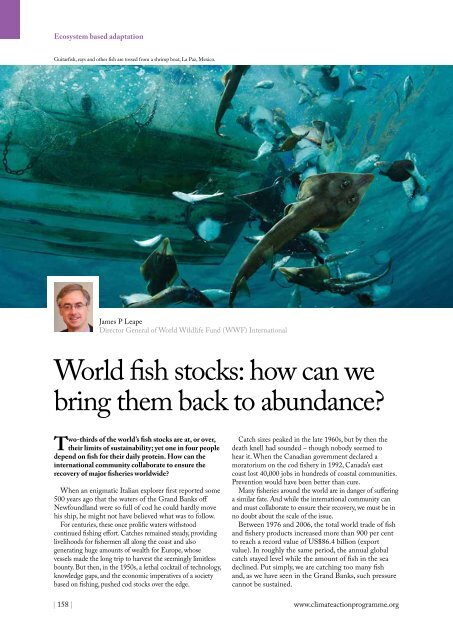Climate Action 2010-2011
You also want an ePaper? Increase the reach of your titles
YUMPU automatically turns print PDFs into web optimized ePapers that Google loves.
Ecosystem based adaptation<br />
Guitarfish, rays and other fish are tossed from a shrimp boat, La Paz, Mexico.<br />
James P Leape<br />
Director General of World Wildlife Fund (WWF) International<br />
World fish stocks: how can we<br />
bring them back to abundance?<br />
Two-thirds of the world’s fish stocks are at, or over,<br />
their limits of sustainability; yet one in four people<br />
depend on fish for their daily protein. How can the<br />
international community collaborate to ensure the<br />
recovery of major fisheries worldwide?<br />
When an enigmatic Italian explorer first reported some<br />
500 years ago that the waters of the Grand Banks off<br />
Newfoundland were so full of cod he could hardly move<br />
his ship, he might not have believed what was to follow.<br />
For centuries, these once prolific waters withstood<br />
continued fishing effort. Catches remained steady, providing<br />
livelihoods for fishermen all along the coast and also<br />
generating huge amounts of wealth for Europe, whose<br />
vessels made the long trip to harvest the seemingly limitless<br />
bounty. But then, in the 1950s, a lethal cocktail of technology,<br />
knowledge gaps, and the economic imperatives of a society<br />
based on fishing, pushed cod stocks over the edge.<br />
| 158 |<br />
Catch sizes peaked in the late 1960s, but by then the<br />
death knell had sounded – though nobody seemed to<br />
hear it. When the Canadian government declared a<br />
moratorium on the cod fishery in 1992, Canada’s east<br />
coast lost 40,000 jobs in hundreds of coastal communities.<br />
Prevention would have been better than cure.<br />
Many fisheries around the world are in danger of suffering<br />
a similar fate. And while the international community can<br />
and must collaborate to ensure their recovery, we must be in<br />
no doubt about the scale of the issue.<br />
Between 1976 and 2006, the total world trade of fish<br />
and fishery products increased more than 900 per cent<br />
to reach a record value of US$86.4 billion (export<br />
value). In roughly the same period, the annual global<br />
catch stayed level while the amount of fish in the sea<br />
declined. Put simply, we are catching too many fish<br />
and, as we have seen in the Grand Banks, such pressure<br />
cannot be sustained.<br />
www.climateactionprogramme.org












